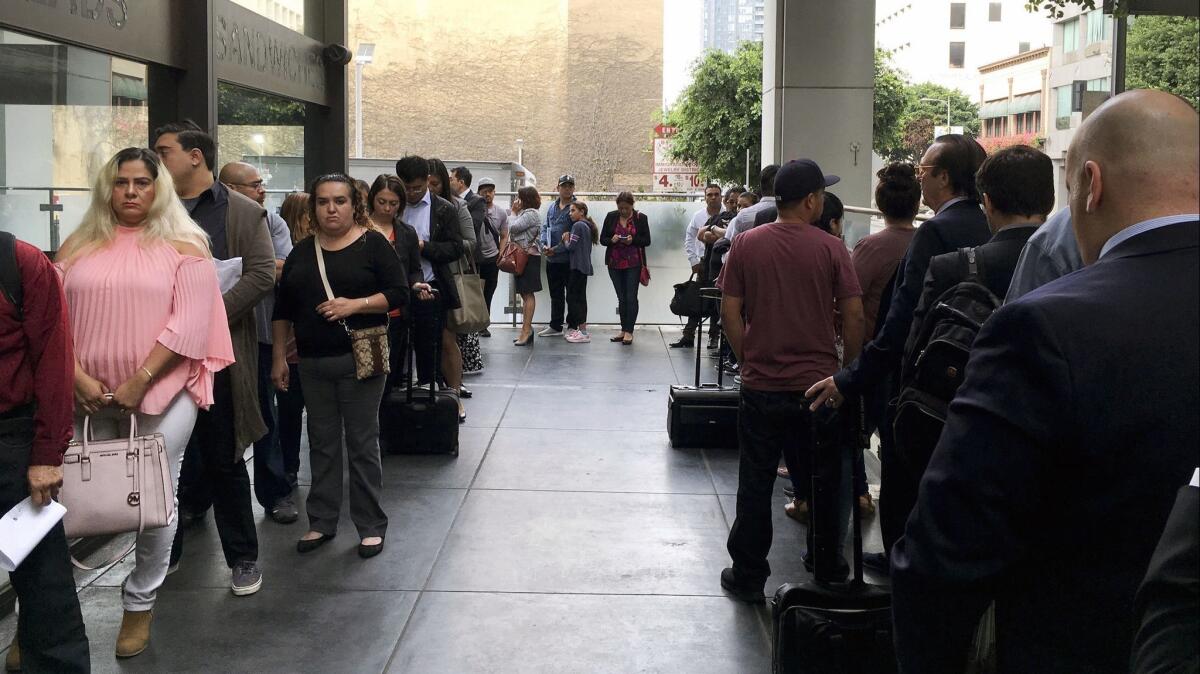Op-Ed: I resigned from the Department of Justice because of Trump’s campaign against immigration judges

- Share via
One of the proudest days of my life was Dec. 16, 2015, when I became a naturalized citizen of the United States.
I shed tears of joy as I swore allegiance to the United States at the Los Angeles Convention Center, along with more than 3,000 other new Americans. I was celebrating a country that had welcomed me with open arms, treated me as one of its own and opened doors I hadn’t known existed. Just a few years before, in the remote village in southern Italy where I grew up, this would have been unimaginable.
Another of my proudest moments came just a year later, when I was awarded a coveted position in the U.S. Department of Justice. This happened in late November 2016, a few weeks after President Trump was elected.
Like many, I harbored reservations about Trump. But I did not waver in my enthusiasm for the job. In law school, l had learned about the role of civil servants as nonpolitical government employees who work across administrations — faithfully, loyally and diligently serving the United States under both Republicans and Democrats.
I couldn’t stand by, or be complicit in, a mean-spirited and unscrupulous campaign to undermine the everyday work of the Justice Department.
I was designated an attorney-advisor and assigned to the Los Angeles immigration court. There, I assisted immigration judges with legal research, weighed in on the strengths and weaknesses of parties’ arguments and often wrote the first drafts of judges’ opinions.
Soon enough, however, the work changed. In March 2018, James McHenry, the Justice Department official who oversees the immigration courts as head of the Executive Office for Immigration Review, announced a mandate imposing individual quotas on all the judges. Each judge would be required to decide 700 cases per year, he said.
With these new quotas, which went into effect on Oct. 1, immigration judges must now decide between three and four cases a day — while also reviewing dozens of motions daily and keeping up with all their administrative duties — or their jobs will be at risk.
The announcement of the quotas in March was the first in a series of demoralizing attacks on immigration judges this year. In May, Atty. Gen. Jeff Sessions, since fired by Trump, personally issued a decision that placed limits on the ability of immigration judges to use a practice known as administrative closure, which allows judges to put cases on indefinite hold, and which, in immigration cases, can be a tool for delaying deportation orders.
The Justice Department enforced the decision in July by stripping an immigration judge in Philadelphia of his authority in scores of cases for continuing to use administrative closure.
All this was in addition to a barrage of disparaging comments made directly by the president. In June, Trump tweeted that there is no reason to provide judges to immigrants. He also rejected calls to hire more immigration judges, saying that “we have to have a real border, not judges” and asking rhetorically, “Who are these people?”
The demoralizing effect on immigration judges was palpable. Morale was at an all-time low. I was new to civil service, but these judges, some of whom have served continuously since the Reagan administration, made clear that this was an unprecedented attack on the justice system.
Enter the Fray: First takes on the news of the minute from L.A. Times Opinion »
I’ve long admired the independence and legitimacy that the judiciary enjoys in the United States, so I found the attacks on judges deeply disturbing and troubling. They reminded me of Trump’s Italian alter-ego, Silvio Berlusconi, who spent most of his tenure as Italy’s prime minister fighting off lawsuits by delegitimizing and attacking the judiciary, calling it “a cancer of democracy” and accusing judges of being communist.
I voiced my concerns to my supervisors and directly to Director McHenry in a letter. Seeing no opportunity to make a positive difference and unwilling to continue to lend credence to this compromised system, I submitted my resignation in July, explaining my reasons in a letter.
This was not how I wanted to end my career in government. I had hoped to serve this country for the long haul. But I couldn’t stand by, or be complicit in, a mean-spirited and unscrupulous campaign to undermine the everyday work of the Justice Department and the judges who serve in our immigration courts — a campaign that hurts many of my fellow immigrants in the process.
Gianfranco De Girolamo was an attorney at the Department of Justice from 2017 to 2018.
Follow the Opinion section on Twitter @latimesopinion or Facebook
More to Read
A cure for the common opinion
Get thought-provoking perspectives with our weekly newsletter.
You may occasionally receive promotional content from the Los Angeles Times.










